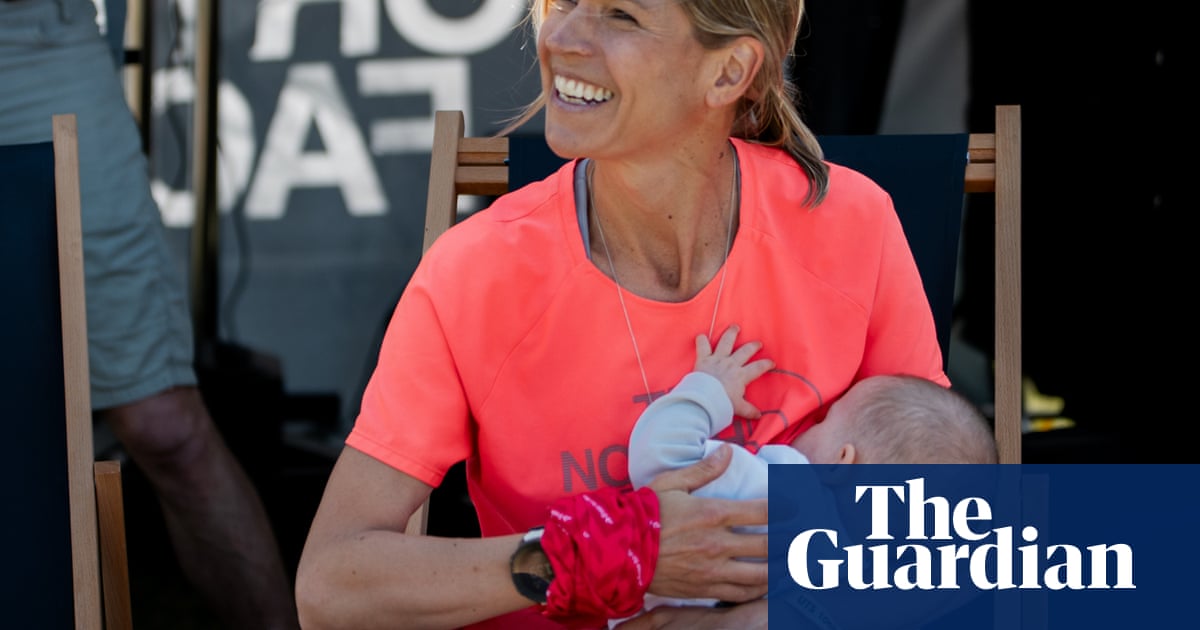In Chamonix Stephanie Case is swaying the sway of a new mother. Pepper, her baby, is cocooned in a sling, defying sleep and gurgling politely over the video call. They became viral sensations last month when ultrarunner Stephanie won the women’s section of the Snowdonia ultra-trail, a 100km race with 21,000ft of ascent, while stopping to breastfeed Pepper en route.
It was an extraordinary achievement six months after giving birth and slots into an extraordinary life – on the one hand, a human rights lawyer, working in warzones around the world; on the other, an ultrarunner, whose charity,Free to Run,empowers young women and girls in areas of conflict.
Case is desperate the race is not held up as something to beat new mothers with. “The response has been so positive, but there has been a negative cohort,” she says. “Part of those are just misogynists, but the others are exhausted mums who look at this story and think, oh my God, I could never do that. Now there’s even more pressure on us to be able to have a baby and work and run races and now breastfeed during races.
“I don’t want anyone to feel badly about themselves out of a story like this. I’m quite open about how hard it is and how much support I have, and the messy parts of it. At 95k I was done, dry heaving and peeing all over myself. I ran with devices internally. It’s not all rainbows and bunnies and a lot of things have to come together for something like that to happen.”
She praises French maternal healthcare – a week in hospital and then 10 sessions with the midwife doing pelvic floor rehab “which is weird and intimate but so helpful. Luckily, people who are in the health field around Chamonix are used to dealing with athletes so I have lots of tricks to help me.”
Case was running six weeks after Pepper’s birth, but everything had changed. She now had to fit her schedule around a baby, circling back to slot in a feed. “When you exercise, lactic acid gets into your breast milk. It doesn’t change the nutritional value, but it does change the taste. I think she just got used to it and dealing with me being sweaty.
“It was more learning how to calm myself down and not come in anxious because then she’d pick up on that energy. I had to shut off that I was in the middle of a training block. I had to do the same in the race and just focus on trying to feed her.”
Despite the photos from Snowdonia of a beaming Case and a bonny Pepper, the road to conception has been hard. The 42-year-old had two miscarriages, then two egg retrievals and three rounds of IVF. The process confused her relationship with running, something she had come to rely on to cope with the stress of her job.
“It can be very difficult to process some of the things I witness and the stories I hear. I find the best way to deal with those situations is to process it through movement. When I’m out on the trails, I can see black garbage coming out of my head and littering the trails behind me and then it’s done.”
After the first miscarriage, well-meaning friends questioned whether running could have played a part and it planted a seed of doubt in her head that became impossible to budge. Desperate to become pregnant, she started to pull back from running. “It was very destabilising because that was a core part of my identity. Not just who I am, but how I lived my life.
“My year was structured around my race calendar and suddenly there was no race calendar. When I got pregnant and miscarried the second time, people questioned whether it was the stress of my job that caused the miscarriage. I used to use running to deal with stress so I felt like I couldn’t win.”
Sign up toThe Recap
The best of our sports journalism from the past seven days and a heads-up on the weekend’s action
after newsletter promotion
Before returning to her home in Chamonix for the last trimester of her pregnancy, Case had been based in Jerusalem for the three and a half years, covering Syria, Jordan, Lebanon, the West Bank and Gaza. She spent the beginning of 2024 in Gaza as part of the humanitarian response, meeting women who had just given birth on the floor of a shelter and were living in tents without proper nutrition. “It was quite hard for me to ask my body to produce a life and that’s exactly what I was trying to do. It felt impossible.”
But, against all odds, the vagaries of IVF worked and Pepper was born in November. Snowdonia was Case’s first race in three years.
It will not come a surprise to learn that Case is not planning on taking it easy any time soon. As part of the North Face explorer team, she has made a documentary film about fertility and running, due out in the autumn, is running in theHard Rock 100 in Coloradoin July and a return to work beckons.
All pretty extraordinary, especially for a self-confessed school nerd who played in the wind band and was so embarrassed after doing well in a cross-country race as a nine-year-old that she went bright red and withdrew from sport for a decade.
